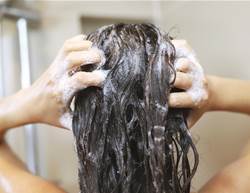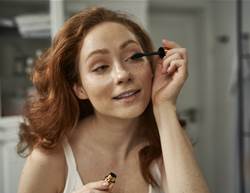You step into the shower, stand beneath the flowing water, open your favourite bottle of shampoo, and then allow your scalp to feel invigorated. It’s a hair wash day routine that we’re all too familiar with. So familiar, in fact, that when that day rolls around, it’s like we’re on autopilot. Yet its simplicity has raised a question among many: how often should you be washing your hair, really?
You may think that the frequency in which you should wash your hair would be based solely on your hair type—but not quite. Sure, knowing your hair type will guide you in terms of how often you should wash your hair, but it turns out that the key to determining how many wash days you should have in a week depends on your individual scalp health.
How often should you wash your hair?
“It’s important for people to follow their own biology and to pay attention to what their hair and scalp may be hinting at,” says dermatologist Dr Mona Gohara. Because the thing is, everyone is different, and our scalps all have different needs.
Dr Gohara explains that it’s all about your scalp’s oil production and not necessarily about whether your hair is straight, wavy or curly. “If your scalp is oily, you may want to wash it with more regularity. If your scalp is drier, then you may want to wash it less frequently—regardless of hair type.” Since oil production and product residue varies from person to person, you may shampoo every other day, while someone else can get away with washing once a month.
Presuming your scalp doesn’t have any skin conditions, a general recommendation is to wash your hair when you start to see buildup, your scalp starts to feel itchy, or when you’ve been reaching one too many times for dry shampoo.
Now, if you’ve got a head full of curls, you may think that curly hair tends to be drier than other types. But that’s not the case. Again, it depends on the natural oils on your scalp.
“The most important thing is using the right products for your curly hair, making sure that you’re bringing in moisture, and that you’re not shampooing every day,” says curly hairstylist Ona Diaz-Santin. Depending on how quickly your natural oils can travel down your hair shaft can determine how frequently you need to lather up.
Factors that contribute to how often you should shampoo
You’ve recently been working up a sweat during hot yoga or noticed white flakes or extra oiliness on your scalp. These are examples that can determine how often you should wash your hair. Sweat and oils from exercising can buildup on your scalp and may drive you to wash more frequently than your usual routine, and that’s okay, as long as you don’t wash daily.
“If you’re used to washing once every couple of weeks or once a week, you may need to then wash two or three times a week or wash with more regularity because it will prevent that buildup,” advises Dr Gohara. And those white flakes you see can be a sign of seborrheic dermatitis aka dandruff, which is an SOS from your scalp alerting you that you may need to wash more often with a dandruff shampoo.
What happens when you wash your hair too much?
Of course, with almost everything in life, finding a balance is essential. Too much or too little of anything can be a recipe for disaster. “Over and under washing your scalp can lead to damaging side effects,” warns trichologist and hair expert Shab Reslan.
If you notice your strands becoming very brittle or overly dry it could be a sign that you need to scale back on shampooing—hair that’s brittle could lead to breakage.
What happens when you don’t wash your hair enough?
Under-washing, though, is where things can get a bit grim. Not shampooing enough can lead to various scalp issues including inflammation, redness, soreness, breakouts, and flaking. An unbalanced scalp may lead to hair thinning or even hair loss, adds Reslan. If you notice any of these changes then you may need to tweak your routine to better suit your scalp environment. And of course, always consult a specialist if you have any concerns.
Choose the right shampoo
Along with keeping your scalp’s needs in mind, many shampoos are formulated for specific hair textures. A good example of this is curly hair types. Apart from shampoos, Diaz-Santin notes that cleansing conditioners are options for those who prefer the no-poo or co-washing method for their curls.
For straight (type 1) or wavy (type 2) types that may have a dry scalp, the MoroccanOil Hydrating Shampoo is one to try because its oils aren’t too heavy meaning it won’t weigh down the hair. For those dealing with dandruff, Dr Gohara recommends, Selsun Blue, which contains selenium to help combat those pesky flakes. If you tend to be oily, go the extra mile by adding a scalp exfoliant to your routine to further break up buildup and manage excess oil.
Those who say that healthy hair begins with the scalp may be on to something. No one scalp is the same therefore learning if yours needs some TLC or simply picking up on tell-tale signs can help you determine how frequently you should wash your hair. Although the answer isn’t straightforward, if you find a shampoo that works for you while remembering not to under-wash or over-wash, you’re already on the right path.
.jpg&h=630&w=1120&c=1&s=1)









